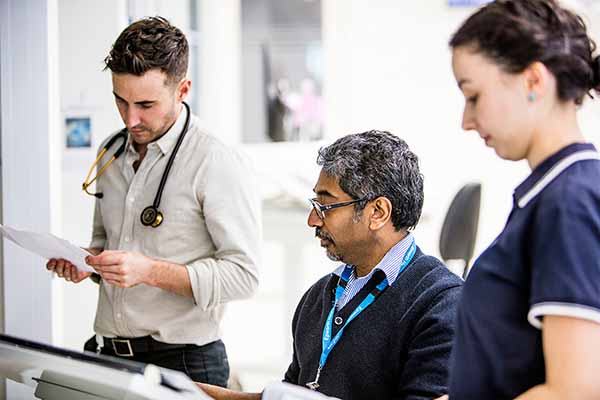Overview
Learning that you or someone you care for has skin cancer can be a very overwhelming and frightening experience. From initial diagnosis through to cure or relapse, our Epworth care team will provide support for you and your family at every step of your cancer care journey.
Each person living with skin cancer has individual needs depending on their symptoms, condition, and the stage of their cancer. Therefore, our team will proactively adjust the level of emotional and physical care provided to best suit your changing care needs and provide further options of support such as physiotherapy, dietitians, occupational therapists, and psychologists.
Epworth fact sheet | What is skin cancer?
-
What is skin cancer?
Skin cancer is when damaged cells grow in an uncontrollable way and form tumours that may or may not spread to other parts of the body.
-
What are the risk factors for skin cancer?
Factors that may put you at higher risk of developing skin cancer include:
- Fair skin tones
- Sunburn
- Unprotected UV radiation exposure
- Atypical (Unusual looking) moles
- Depressed immune system
If you would like to learn more about the risk factors for skin cancer or how to protect your skin, we recommend that you visit the SunSmart website.
-
What are the types of skin cancer?
There are two types of skin cancer:
- Melanoma
Melanoma occurs when the pigment-producing cells that give colour to the skin become cancerous. - Keratinocyte
Keratinocyte cancers, also known as non-melanoma skin cancers are the most common type of skin cancer in Australia and less dangerous than melanoma skin cancer.
- Melanoma
Signs and symptoms of skin cancer
If you have noticed a change to your skin or general health, book a consultation with your GP as soon as possible. Catching cancer quickly can save your life.
It's natural for changes to occur to your skin as you age or throughout the seasons and weather. However, we encourage you to recognise what is normal for your body and if changes are persistent consult your GP for peace of mind.
Signs and symptoms of skin cancer can include:
- Thickened red and scaly spot on the skin
- Rapidly growing lump that may be tender to touch
- A change in colour, size, or shape of a mole
- A mole begins to itch or bleed
- Any crusty, non-healing sores
Notice changes and act quickly
Diagnosing skin cancer
Screening for skin cancer
A screening test allows a doctor to routinely check for types of cancer such as breast cancer. Unfortunately, there is currently no screening test for skin cancer.
How is skin cancer diagnosed?
To investigate your health concerns, your specialist or doctor may schedule one or several of the following skin cancer tests:
Magnifying tools
Depending on symptoms, your doctor may inspect your moles or skin using a hand-held magnifying tool.
Biopsy
Your doctor may request that you undergo a biopsy after they inspect your skin with a magnifying tool. A biopsy is the removal of a small piece of tissue that will be examined under a microscope.
Staging - Investigating the extent of the cancer
Following the biopsy results, your specialist will stage your skin cancer from 0 – 4. Staging helps your care team and specialists to create a unique treatment plan.
What does my cancer stage mean?
Stage 0
Stage 0 melanoma (melanoma in situ) is when the cancer has not grown deeper than the top layer of the skin.
Stage 1
The cancerous tumour is relatively small and the cancer has not yet spread to other tissue.
Stage 2
Cancerous tumour remains relatively localised but has spread to nearby tissue beyond its origin.
Stage 3
Cancer has spread regionally and affected surrounding tissue, and may have grown.
Stage 4
Sometimes called advanced cancer, stage 4 means cancer has spread to other tissue or organs beyond the region where it originated.
Find your Epworth specialist for skin cancer
Surgical oncologists | Dermatology service | Radiation oncology service | Plastic and reconstructive surgery service
Treatment for skin cancer
We understand that treatment options can be overwhelming. Epworth oncologists and specialists are here to guide and support you to make the best choice for your health.
Skin cancer treatment at Epworth
Following a diagnosis of skin cancer, your oncologist and cancer care team will create a treatment plan tailored to the specific stage and type of cancer. Your Epworth specialist will discuss the treatment options with you and consider your circumstances and your preferences.
Below is an overview of common skin cancer treatments:
Surgery
Surgery is the main form of treatment for skin cancer and in some cases can completely cure your cancer. Depending on your type of skin cancer and stage, your care team may recommend surgery where the mole and a section of the surrounding skin is removed.
Radiotherapy
Radiotherapy is the use of radiation to treat and manage cancer and may be used in conjunction with other forms of treatment. Radiotherapy at Epworth is supported by the latest world-class technology and evidence-based techniques, a highly experienced team of radiation oncologists, radiation therapists, physicists and nurses are committed to providing compassionate and exceptional care.
Why choose Epworth for cancer care?
Epworth HealthCare is Victoria's largest not-for-profit private hospital group. Renowned for excellence in diagnosis, treatment, care and rehabilitation. Epworth is an innovator in Australia’s health system, embracing the latest in evidence-based medicine to pioneer treatments and services for our patients.
Supported by excellent facilities, we integrate clinical practice with education and research to deliver outstanding patient care, each and every day.
Epworth cancer care locations
Epworth Rehabilitation
Skin cancer locations:
Skin cancer rehabilitation
Who is the program for?
Our cancer rehabilitation program is designed for anyone diagnosed with skin cancer at any time from diagnosis to treatment and recovery.
Rehabilitation doesn't start after your treatment has ended. You may benefit from our holistic rehabilitation programs at any time throughout your cancer journey. Our programs can support you to physically and emotionally prepare for treatment and restore your strength and wellbeing.
What does the cancer rehabilitation program involve?
Before you start
You will meet a rehabilitation doctor and allied health team for a medical, psychosocial, and physical assessment.
Everyone's cancer care journey is different. The assessments will help the team understand your specific needs to develop the right program for you. You will work with the team to develop goals to work towards throughout the program.
During the program
Depending on your assessment and individual needs, you may complete your program:
- as part of a group, with other people, who have been diagnosed with varying cancers
- on your own
Most people will attend as an outpatient, coming to hospital for a few hours once or twice a week, over several weeks. Some people may need to stay overnight in hospital and complete a program over several consecutive days.
Either way, you will receive the same support from our team to address your physical, functional and emotional needs.
Your program may include:
- A physical exercise component to help restore movement, strength and fitness
- An educational component where you will learn about different areas associated with your cancer diagnosis and treatment and how to manage them, including:
- fatigue
- pain
- emotional wellbeing
- body image and self-esteem
- work or family challenges
- relationships
- late-onset of side effects.
At the end of your program
Our rehabilitation team will keep in touch with your referring doctor and/or treating team throughout the program and our team will keep them informed about your progress.
They will also connect you to local services and support networks so you can leave our program with the strength and confidence to live life to your fullest potential.
Who will support me during the rehabilitation program?
Depending on your needs, you may see some or all of our multidisciplinary team which includes:
- Rehabilitation specialist doctor
- Cancer nurse
- Exercise physiologist
- Physiotherapist
- Psychologist
- Social worker
- Occupational therapist
- Dietitian.
How can I access a rehabilitation program?
Referrals
A referral from your specialist or GP is required to participate.
Ask your doctor to complete the referral form at www.epworth.org.au/rehab and return it to us via fax: 03 9982 6696 or email: [email protected]
Locations
Group programs are located at Epworth Camberwell and Epworth Hawthorn.
Individual programs can be accessed at Epworth Brighton, Epworth Camberwell, Epworth Geelong, Epworth Hawthorn or Epworth Richmond Rehabilitation.
Contact us
If you have any questions about our cancer rehabilitation programs, call us on: 1300 345 600.
Life after skin cancer
Life after skin cancer treatment can pose its own challenges but our Epworth specialists are here to support you.
Life after treatment
Life after skin cancer treatment can be a mixture of emotions. You may not 'bounce back' as quickly as you like, but be kind to yourself and start making plans with your family or carers.
Remember that:
- You may still feel fatigued for a while after finishing treatment.
- If required, make an advanced care plan.
- Ask for help. If your body has changed due to treatment, remember help is out there to support you to feel your best and regain your sense of identity and self-esteem. Speak with your care team about options to support your general wellbeing after treatment.
Follow-up appointments
If you’re in remission for skin cancer you will likely need follow-up appointments with your care team to ensure abnormal cells have not returned and to check in on your overall wellbeing.
Palliative care
In some cases, palliative care may be discussed with you and your family in some cases. Epworth palliative care aims to relieve you of symptoms and manage pain.
Find your Epworth specialist for skin cancer
Surgical oncologists | Dermatology service | Radiation oncology service | Plastic and reconstructive surgery service

